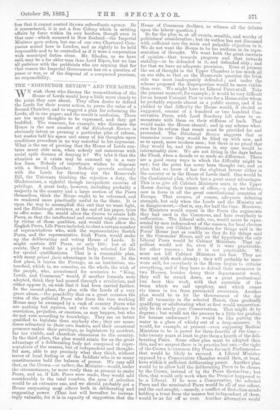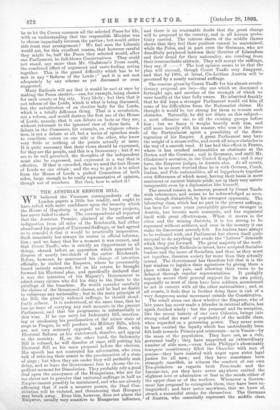THE "EDINBURGH REVIEW" AND THE LORDS.
WE wish those who discuss the reconstitution of the House of Lords would keep a little more closely to the point they care about. They often desire to defend the Lords for their recent action, to prove the value of a Second Chamber, and to suggest a plan for reforming the Lords, all in one paper • and the result is confusion. There are too many thoughts to be expressed, and they get huddled. The reasoner, for example, who discusses the House in the new number of the Edinburgh Review is obviously intent on pressing a particular plan of reform, but wastes half his space and many of his thoughts upon conditions precedent in no way essential to his argument. What is the use of proving that the House of Lords con- tains many able men, when nobody not rancorous with social spite dreams of denying it? We take it that the situation as it exists may be summed up in a very few lines. Nobody of importance wishes to dispense with a Second Chamber. Nobody quarrels seriously with the Lords for throwing out the Home-rule Bill, the Unionists thinking the rejection a duty, the Gladstonians, a rightful though inexpedient exercise of privilege. A great body, however, including probably a majority in the country and a large section of the Peers themselves, think the House ought to be reformed, and so rendered more practically useful to the State. It is upon the way to accomplish this end that we want light, and the Edinburgh reviewer, at the end of his paper, tries to offer some. He would allow the Crown to create Life Peers, so that the intellectual and eminent might come in, by virtue of those qualities, and would then allow the English Peers, Life Peers included, to elect a certain number of representatives who, with the representative Scotch Peers, and the representative Irish Peers, would make up the deliberating and voting House of Lords. It might contain 200 Peers, or only 100; but at all events, they would be a picked body, selected for life for special qualifications. That is a reasonable plan, with many prima, facie advantages in its favour. In the first place, it leaves the Peerage, as an institution, un- touched, which is, we conceive, on the whole, the wish of the people, who, accustomed for centuries to "King, Lords, and Commons," would, if another formula were adopted, think they had passed through a revolution, and either oppose it, or wish that it had been carried farther. In the second place, the plan rids the Lords of a very grave abuse,—the possibility that on a great occasion the votes of the political Peers who form the true working House may be swamped by a rush of country Peers who are nothing but squires, and who vote in obedience to conviction, prejudice, or emotion, as may happen, but who do not vote according to knowledge. They are no better qualified to legislate than anybody else; • they are some- times refractory to their own leaders, and their occasional presence makes their privilege, as legislators by accident, far too visible, and therefore obnoxious to the country. In the third place, the plan would retain for us the great advantage of a deliberating body not composed of repre- sentatives of the masses, but of independent and thought- ful men, able to say precisely what they think, without terror of local feeling or of the faddists who in so many constituencies hold the balance of .power. We may add that, as the Crown—or rather, the Minister—would, under the circumstances, be more ready than at present to make Peers, and as, if Life Peers were made, they would add considerably to the total number, the area of selection would be an extensive one, and we should probably get a House surpassing mot others both in deliberating and suggesting power. (That last will hereafter be increas- ingly valuable, for it is in capacity of suggestion that the House of Commons declines, as witness all the debatei upon the labour question.) So far the plan is, at all events, sensible, and worthy of politicians' consideration ; but its author has not discussed with sufficient care the main and palpable objection to it. We do not want the House to be too uniform in its repre- sentation of thought. We want both the great currents of opinion—that towards progress and that towards stability—to be defended in it, and defended ably ; and for that we have no adequate provision. Even at present the set of thought in the Upper Chamber is too much all on one side, so that on the Home-rule question the Irish side was most inadequately defended • and under the scheme proposed the disproportion would be more visible than ever. We might have no Liberal Peers at all. Take the present moment, for example ; it would be very difficult for an honest Unionist Peer to vote for a Home-ruler whom he probably regards almost as a public enemy, and if he yielded to that difficulty the House would, if elected as suggested, consist of a hundred or two hundred Con- servative Peers, with Lord Rosebery left alone to re- monstrate with them on their stiffness of back. That would make the House absurd ; and ill any scheme what- ever for its reform that result must be provided for and. prevented. The Edinburgh Review suggests that as vacancies occur they would be filled up with new, and so to speak, more modern men ; but there is no proof that they 'would be, and the process in any case would be interminably slow. We are not living in the days before the Flood, when a decade or so made no difference. There are a good many ways in which the difficulty might be met; but the point has never been thought out, and no plan that we know of has the slightest favour either in the country or in the House of Lords itself. One would be the Continental plan, which has a great many advantages. This is to give all Cabinet Ministers seats in the Upper House during their tenure of office,—a plan, we believe, now in force in all the great constitutional countries of Europe. That secures, of course, adequate debating strength, but only when the Lords and the Ministry are in disagreement,—that is, say, for half the time. Moreover, the Ministers would repeat in the Peers the arguments they had used in the Commons, and bore everybody to suffocation. Tlie Liberal side, too, would never be repre- sented by men independent of the masses, for local electors would turn out Cabinet Ministers for things said in the Peers' House just as readily as they do for things said in the Commons' House, and on the hypothesis the only Liberal Peers would be Cabinet Ministers. That ex- pedient would not do, even if it were practicable, for other reasons ; but it is not practicable. We must not kill Cabinet Ministers too fast. They are worn out with work already ; they will probably be more worn still, for everybody in the House begins to criticise everything, and if they have to defend their measures in two Houses, besides doing their departmental work, they will be struck down, as a great professional has been this week, with that aneurism of the brain which we call apoplexy, and which comes six times in ten from protracted overstrain. Another plan would be to let the Government of the day fill all vacancies in the selected Housee, thus gradually qualifying or adulterating what at first would unquestion- ably be its nearly pure Conservatism. That might do by degrees ; but would not the process be a little too gradual for human endurance? It would be like putting the water in a glass of whisky out of a drop-measure. It would, for example, at present—even supposing Radical Ministers to be in power for three-fourths of the time— take twenty years at least to give them a fourth of the deli- berating Peers. Some other plan must be adopted than this, and we suspect there is in practice but one,—the right of the Crown to summon fifty Peers for each Parliament— that would be likely to succeed. A Liberal Ministry opposed by a Conservative Chamber would then, at least, have within it sufficient deliberating power. Another plan would be to allow half the deliberating Peers to be chosen by the Crown, instead of by the Peers themselves ; but then, that would only work when the Premier happened to be a Liberal. If he were a Conservative, the selected Peers and the nominated Peers would be all of one colour, and the end sought, —namely, a conflict of first-class minds holding a trust from the masses but independent of them, would be as far off as ever. Another alternative would be to let the Crown summon all the selected Peers for life, with an understanding that the responsible Minister was to choose impartially between the parties ; but would either side trust that arrangement ? We feel sure the Liberals would not, for this excellent reason, that however careful they might be, half the Peers they selected would, after one Parliament, be full-blown Conservatives. They could not stand, any more than Mr. Gladstone's Peers could, the combined effect of argument and caste-feeling acting together. This is the grand difficulty which has to be met in any "Reform of the Lords ;" and it is not met adequately by any scheme as yet discussed or even suggested. Many Radicals will say that it would be met at once by making the Peers elective,—one, for example, being chosen for each county or big city. Very likely ; but then that is not reform of the Lords, which is what is being discussed, but the substitution of an elective body for the Lords, which is a totally different thing. That is a revolution, not a reform, and would destroy the first use of the House of Lords, namely, that it can debate on facts as they are, without reference to the ignorant view of those facts. A debate in the Commons, for example, on religious educa- tion, is not a debate at all, but a series of speeches made to conciliate voters on one side or the other, who know very little or nothing of the points actually at issue. It is quite necessary that their views should be expressed, for they are the people, and this is a Democracy ; but if we are to be well governed, the thoughts of the independent must also be expressed, and expressed in a way that is effective. If that is conceded, then we need the best House of Lords we can obtain ; and the way to get it is to select from the House of Lords a picked Committee of both sides, large enough to be really representative of opinion, though not of numbers. But then, how to select it ?







































 Previous page
Previous page